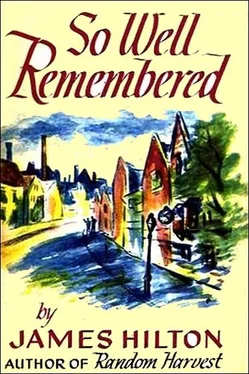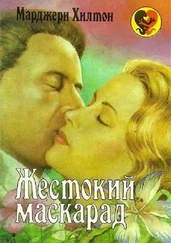Джеймс Хилтон - So Well Remembered
Здесь есть возможность читать онлайн «Джеймс Хилтон - So Well Remembered» весь текст электронной книги совершенно бесплатно (целиком полную версию без сокращений). В некоторых случаях можно слушать аудио, скачать через торрент в формате fb2 и присутствует краткое содержание. Год выпуска: 1945, Жанр: Проза, на английском языке. Описание произведения, (предисловие) а так же отзывы посетителей доступны на портале библиотеки ЛибКат.
- Название:So Well Remembered
- Автор:
- Жанр:
- Год:1945
- ISBN:нет данных
- Рейтинг книги:5 / 5. Голосов: 1
-
Избранное:Добавить в избранное
- Отзывы:
-
Ваша оценка:
- 100
- 1
- 2
- 3
- 4
- 5
So Well Remembered: краткое содержание, описание и аннотация
Предлагаем к чтению аннотацию, описание, краткое содержание или предисловие (зависит от того, что написал сам автор книги «So Well Remembered»). Если вы не нашли необходимую информацию о книге — напишите в комментариях, мы постараемся отыскать её.
So Well Remembered — читать онлайн бесплатно полную книгу (весь текст) целиком
Ниже представлен текст книги, разбитый по страницам. Система сохранения места последней прочитанной страницы, позволяет с удобством читать онлайн бесплатно книгу «So Well Remembered», без необходимости каждый раз заново искать на чём Вы остановились. Поставьте закладку, и сможете в любой момент перейти на страницу, на которой закончили чтение.
Интервал:
Закладка:
George went on without realizing the extent of his conquest: “Aye, it was the only place I was ever left alone in those days, because we were a large family, and a four-roomed house doesn’t allow for much privacy. Fortunately my father started work at six in the morning and didn’t come home till six at night—I hardly saw him except on Sundays when he marched us all off to chapel.”
“Ah, grand folks, those old Nonconformists,” murmured the Bishop, turning on the magnanimity.
“He was a local preacher too,” George continued, pointing suddenly up Mill Street. “There’s the chapel, and there”—swinging his arm in the opposite direction—“there’s Channing’s Mill, where he worked—”
“CHANNING’S? Not—er—Channing and Felsby?”
“Aye, that’s what it used to be. You knew of it?”
“I’m afraid so.” The Bishop smiled ruefully. “I—er—I once had a few shares in it.”
“You were better off than my father, then, because he had a lifetime in it. From the age of ten to the day he died—fifty years, and for half of every year, except on Sundays, he only saw daylight through the mill windows.”
“Ah, terrible—terrible,” murmured the Bishop.
George chuckled. “Maybe, but he didn’t feel that way. I don’t believe it ever occurred to him. He was quite content all week looking forward to Sunday.”
“When he enjoyed his preaching, no doubt.”
“You bet he did, and he was a dab hand at it too. I’ve heard him last a couple of hours, without a note, and fluent all the time.”
The Bishop sighed. “Ah, that’s a wonderful thing—to possess the gift of tongues, so that one never has to think for a word—”
“Maybe that’s it,” said George. “It’s the thinking that spoils it.” His eyes twinkled and his voice, as nearly as a voice can, nudged the Bishop in the ribs. “Once I remember my father started off a prayer with ‘Oh God, if there be a God’—but he said it in such a grand booming voice that nobody noticed it any more than he had.”
“Except you,” interjected Lord Winslow, who had been overhearing the conversation from the other side. George turned, a little startled at first, and then, seeing a smile on his lordship’s face, smiled back and replied thoughtfully: “Aye, that’s so. I suppose I was always a bit of a one for noticing things.”
By then the band had finished playing and it was time for George to open the proceedings. He did so in a speech that lasted a few minutes only; one of his virtues, innocently acquired because he regarded it as a drawback, was that ceremonial oratory did not come easily to him. But he had a pleasant voice and a knack of using simple words as a first-class workman uses tools; his newspaper editorials were not so good, because he ‘polished’ them too much. There was also a hint of the child in him that appeared now in his unconcealed and quite unconcealable pleasure; he could not help letting Browdley know how pleased he was, not only with the town for having elected him one of its councillors, but doubtless also with himself for having so well merited the honour. A certain inward modesty made tolerable, and even attractive, an outward quality that might have been termed conceit. And when, having briefly introduced Lord Winslow, he sat down amidst another gust of applause, the life of the gathering seemed to centre on his still beaming countenance rather than on the tall, thin, pallid stranger who rose to pay him conventional compliments.
Winslow, of course, was a much better speaker by any erudite standards. To the acceptable accent of English aristocracy and officialdom he added an air of slightly bored accomplishment that often goes with it, and the chiefly working-class audience gave him respectful attention throughout an address that was considerably above their heads. Had he been of their own class they might have shouted a few ribald interruptions, but they would not do this to a stranger so clearly of rank; indeed their patient silence implied a half-affectionate tolerance for ‘one of the nobs’ who eccentrically chose to interest himself in Browdley affairs instead of in the far more glamorous ones they imagined must be his own—the sort of tolerance that had evoked an audible exclamation of “Poor little bugger!” from some unknown citizen when, a few years back, a royal prince had passed through the town on an official tour. To Browdley folk, as they looked and listened now, it seemed that Lord Winslow was all the time thinking of something else (as indeed he was), but they did not blame him for it; on the contrary, the cheers when he finished were a friendly concession that he had doubtless done his best and that it was pretty decent of him to have bothered to do anything at all.
Then the Bishop prayed, the foundation stone was well and truly laid, sundry votes of thanks were passed, the band played ‘God Save the King’, and the ceremony petered out. But Councillor Boswell seemed loth to leave the scene of so much concentrated personal victory. He gripped Winslow’s arm with proprietary zeal, talking about his plans for further slum-clearances while from time to time he introduced various local people who hung around; and finally, when most had disappeared to their homes and the Bishop had waved a benign goodbye, George escorted his principal guest to the car that was to take him back to Browdley Station. It was not only that he knew Winslow was important and might at some future date do the town a service; nor merely that he already liked him, for he found it easy to like people; the fact was, Winslow was the type that stirred in George a note of genuine hero-worship —and in spite, rather than because, of the title. After all, a man couldn’t help what he inherited, and if he were also a high Government personage with a string of degrees and academic distinctions after his name, why hold mere blue blood against him? It was the truer aristocracy of intellect that George admired—hence the spell cast over him by Winslow’s scholarly speech, his dome-like forehead, and the absent- minded professorial manner that George took to be preoccupation with some abstruse problem. He had already looked him up in Who’s Who, and during the drive in the car through Browdley streets humility transformed itself into na ve delight that an Oxford Doctor of Philosophy had actually accepted an invitation to have tea at his house.
George was also delighted at the success of his own ruse to side- track the Mayor and the other councillors and get Winslow on his own, and most delighted of all, as well as astonished, when Winslow said: “Good idea, Boswell—I had been on the point of suggesting such a thing myself. My train is not for an hour or so, I understand.”
“That’s right, no need to hurry,” George replied. “And there’s later trains for that matter.”
Winslow smiled. “Well, we have time for a cup of tea, anyhow.” And after a pause, as if the personality of George really interested him: “So you come of an old Browdley family?”
“As old as we have ‘em here, sir, but that’s not so old. My great- great-grandfather was a farm labourer in Kent, and our branch of the family moved north when the cotton-mills wanted cheap labour. I haven’t got any famous ancestors, except one who’s supposed to have been transported to Australia for poaching.” He added regretfully: “But I could never get any proof of it.”
Winslow smiled. “At any rate, your father lived it down. He seems to have been a much respected man in Browdley.”
George nodded, pleased by the tribute, but then went on, with that disconcerting frankness that was (if he had only known it, but then of course if he had known it, it wouldn’t have been) one of his principal charms: “Aye, he was much respected, and for twenty years after he died I went about thinking how much I’d respected him myself, but then one day when I was afraid of something, it suddenly occurred to me it was the same feeling I’d had for my father.”
Читать дальшеИнтервал:
Закладка:
Похожие книги на «So Well Remembered»
Представляем Вашему вниманию похожие книги на «So Well Remembered» списком для выбора. Мы отобрали схожую по названию и смыслу литературу в надежде предоставить читателям больше вариантов отыскать новые, интересные, ещё непрочитанные произведения.
Обсуждение, отзывы о книге «So Well Remembered» и просто собственные мнения читателей. Оставьте ваши комментарии, напишите, что Вы думаете о произведении, его смысле или главных героях. Укажите что конкретно понравилось, а что нет, и почему Вы так считаете.










